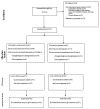The effect of calcium on the duration of acute gastroenteritis in children: A randomized clinical trial
- PMID: 34291007
- PMCID: PMC8285556
- DOI: 10.47176/mjiri.35.83
The effect of calcium on the duration of acute gastroenteritis in children: A randomized clinical trial
Abstract
Background: Currently, the role of calcium in reducing the duration and severity of diarrhea and its consequences has been considered as a topic of concern. The aim of this study was to evaluate the effect of oral calcium on the duration of acute gastroenteritis in children. Methods: This single-blind randomized clinical trial was performed from 2014 to 2016 at Ali Asghar Children's Hospital, Tehran, Iran. Totally, 124 patients (one month to twelve years old) with acute gastroenteritis were enrolled in this study. The patients were divided equally into intervention and placebo groups and received the calcium gluconate 10%, 0.5cc/kg/day and distinct water, respectively. Data analysis was performed using the statistical software SPSS version 20.0 for windows (SPSS Inc., Chicago, IL) and p<0.05 was considered significant. Results: The mean age of the intervention and placebo groups was 26.43±3.74 and 20.84±2.70 months, respectively, and the difference was not significant (p=0.228). The duration of diarrhea in the intervention and placebo groups was 5.27±2.01 and 6.71 ± 2.44 days respectively (p=0.001). In the placebo group, the plasma calcium level was less than 8mg/dl in 1 (1.6%), 8 - 10 mg/dl in 55 (88.7%) and more than 10mg/dl in 6 cases (9. 7%). In the intervention group, there were 7 (11.3%), 55 (88.7%) and 0 (0%) cases in three groups, respectively (p=0.005). Conclusion: The oral calcium gluconate might shorten the duration of acute gastroenteritis. Therefore, it could be considered as an adjunctive therapy. Whether the formulation of the oral rehydration solution (ORS) will be updated in the future with adding the calcium salts remains to be defined and needs more investigations.
Keywords: Calcium; Calcium-sensing receptor; Diarrhea; Gastroenteritis; Pediatrics.
© 2021 Iran University of Medical Sciences.
Conflict of interest statement
Conflicts of Interest: None declared
References
-
- World Health Organization. Diarrheal disease.http://www.who.int/news-room/fact-sheets/detail/diarrhoeal-disease.Accessed August 30, 2018.
-
- UNICEF. UNICEF Data: monitoring the situation of children and women. https://data.unicef.org/topic/child-health/diarrhoeal-disease/. Accessed August 30, 2017.
LinkOut - more resources
Full Text Sources
Other Literature Sources

